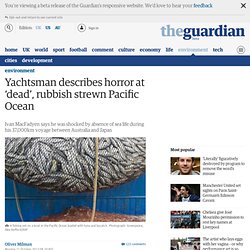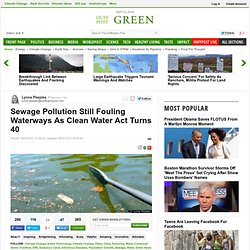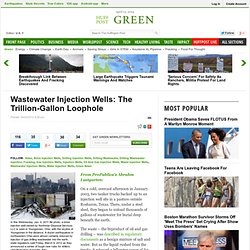

Radioactivity. Earthquakes. Yachtsman describes horror at ‘dead’, rubbish strewn Pacific Ocean. An Australian sailor has described parts of the Pacific Ocean as “dead” because of severe overfishing, with his vessel having to repeatedly swerve debris for thousands of kilometres on a journey from Australia to Japan.

Ivan MacFadyen told of his horror at the severe lack of marine life and copious amounts of rubbish witnessed on a yacht race between Melbourne and Osaka. He recently returned from the trip, which he previously completed 10 years ago. “In 2003, I caught a fish every day,” he told Guardian Australia. “Ten years later to the day, sailing almost exactly the same course, I caught nothing. It started to strike me the closer we got to Japan that the ocean was dead.
Water. DOE Plans to Recycle Radioactive Waste into Consumer Goods. State Department Keystone XL Study Done by Oil Industry-Connected Firm with Big Tobacco, Fracking Ties. Fracking. Geoengineering. Pollution. Energy. Sewage Pollution Still Fouling Waterways As Clean Water Act Turns 40. BROOKLYN, N.Y. -- With each steady stroke, John Lipscomb inched the canoe deeper into an infamous urban waterway.

The water surrounding the boat grew increasingly murky; the sulphuric stench more offensive. "Onward we go into the heart of darkness," said Lipscomb, boat captain for the clean water advocacy group Riverkeeper, as the tips of his oars again disappeared beneath the grey-brown surface of the Gowanus Canal. Riverkeeper's John Lipscomb carries passengers into what he calls the "tunnel of hell. " Before long, the floating debris became too dense to outmaneuver. Tampons, condoms and human feces -- mixed with plastic lids, straws and wrappers -- bobbed around the boat, re-assorting with each stroke.
Lipscomb slowed, then filled the noticeable silence onboard: "It's too gross for words. " Although this Brooklyn waterway is an extreme example, its pollution illustrates the often "direct connection between our waterways and our toilets," explained Lipscomb. "Life is tough," he said. Fracking Regulations In States Leave Wells Without Inspection, Environmental Group Says. Hundreds of thousands of active oil and gas wells go without government inspection in any given year, and fines for regulatory violations are too small to change drilling company behavior, according to an energy watchdog group's review of regulation and enforcement activities in six states.

The 124-page report, released Tuesday by the Oil & Gas Accountability Project at Earthworks, an environmental and public health advocacy group based in Washington, examined well inspection data, violations, enforcement actions and penalties in Colorado, New Mexico, New York, Ohio, Pennsylvania and Texas. The analysis suggested that state regulators are often understaffed, underfunded, or otherwise unable to keep pace with rapidly expanding oil and gas exploration and the attending risk of spills, leaks, contamination and accidents that might arise through negligence or deliberate shortcutting. News Corp. Climate Change Coverage Is Misleading, Analysis Claims.
Arctic Sea Ice Levels Hit Record Low, Scientists Say We're 'Running Out Of Time' Wastewater Injection Wells: The Trillion-Gallon Loophole. From ProPublica's Abrahm Lustgarten: On a cold, overcast afternoon in January 2003, two tanker trucks backed up to an injection well site in a pasture outside Rosharon, Texas.

There, under a steel shed, they began to unload thousands of gallons of wastewater for burial deep beneath the earth. The waste – the byproduct of oil and gas drilling – was described in regulatory documents as a benign mixture of salt and water. Coral Reef Conservation & Climate Change: 'We Have The Environment Facilitating Humanity,' Scientist Says. Imagine if the reefs of the world, once coated by colorful corals, suddenly became bare.

What would it mean for humanity? I reached out to Dr. Stuart Sandin of the Center for Marine Biodiversity and Conservation at UC San Diego's Scripps Institution of Oceanography to learn more about coral reefs. These complex ecosystems are threatened by human activities like overfishing, pollution, and climate change. Bob Burnett: Welcome to Romneyland. Republican presidential candidate Mitt Romney's policies would degrade American life.

If Romney had his way, the U.S. would follow the dysfunctional course of Wyoming, a state run by big oil and gas companies and governed by conservative Republicans. A state where pursuit of corporate profits trumps quality of life. Climate Change: Coral Reefs Expected To Suffer Greatly, Study Finds. Gene Karpinski: A Sharp Contrast on Climate. Now that the fanfare of both party conventions has come to a close, the choice voters face in November is more clear than ever, especially when it comes to confronting the climate crisis.

During his speech at the Republican National Convention, one of Mitt Romney's biggest applause lines came when he mocked then-Senator Obama's 2008 call to address climate change: "President Obama promised to begin to slow the rise of the oceans -- [pauses for audience laughter] -- and to heal the planet. My promise... is to help you and your family. " Romney's opposition to policies that curb harmful global warming pollution is well documented, but this line -- given as he was accepting his party's nomination for president -- takes his climate callousness to a whole new level. Worse, Romney's punchline reveals that he does not understand that protecting the planet will help our families, now and in the future. Just ask those families in Colorado affected by wildfires.